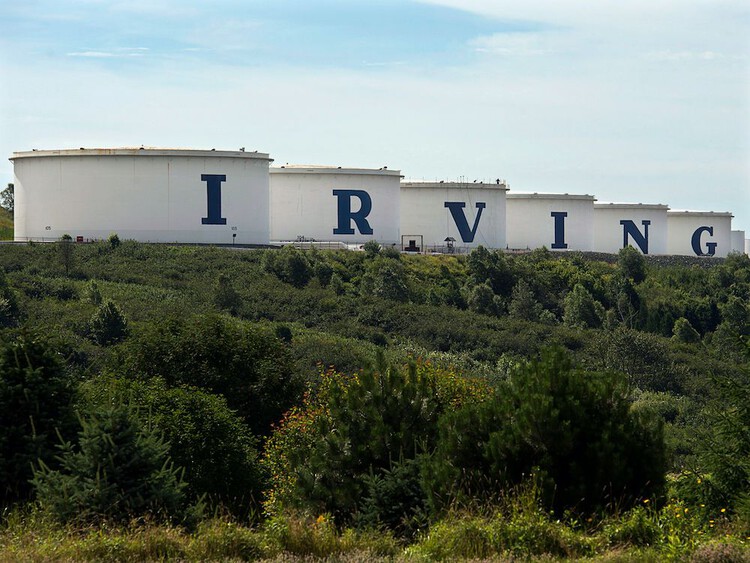“It’s just something they don’t do.”
That’s what New Brunswick’s former chief economist, David Campbell, said about Irving Oil’s public announcement of a strategic review, including a possible full or partial sale. The company is mulling existential questions.

So why are the Irvings — notoriously quiet about business affairs — choosing to say this out loud?
Here’s why — at least, here’s my guess.
Irving Oil has been lobbying hard in Ottawa for months, surely focused on the Clean Fuel Standard, a regulatory regime that pushes petro producers and refineries to become less carbon-intensive in their production. It will cost real money to comply.
It’s a key piece of the climate change action plan devised by the federal Liberals, led by Environment Minister Steven Guilbeault.
Irving Oil and Guilbeault are not getting along.
The minister singled out Irving Oil in a letter urging energy regulators in Atlantic Canada not to let refiners get a price increase July 1, when Clean Fuel Standard rules start coming in. He suggested that refinery margins are fat and healthy, and the company should absorb the cost of compliance, rather than trying to pass it along to consumers.
The company disagrees, and is fighting back. The strategic review will surely propose at least a couple of options that represent a significant economic hit to Atlantic Canada, and New Brunswick in particular.
They could sell the refinery, or close it. They could pivot their business to something else, and move.
I don’t think it’s an idle threat.
On the face of it, you’d think that moving operations somewhere else would be impossible — and that we, the public, should call their bluff. What about the sunk cost of the refinery? Are you seriously going to leave?
But Canada is pushing more and more companies to answer that question “yes.”
Irving Oil has unique features that make its continued presence in New Brunswick a question. It has long imported its crude. (Opportunities to have Canadian crude piped to Saint John fell through when the proponent of the Energy East pipeline cancelled the project during the approval phase in 2017.)
If they do want to keep refining, they could go do it somewhere the regulatory regime isn’t actively trying to destroy them, and where access to crude is easier.
If they want to do something else — still energy, perhaps, but not refining petroleum — there might not be much reason to do it in New Brunswick. Making hydrogen for Europe, for example, makes way more sense to do in Europe than in Atlantic Canada. And Irving Oil already has a footprint there, in Ireland.
The risk is real. And thus the threat may be an effective strategy.
An employer and exporter like Irving Oil, if they scaled back or sold their Atlantic Canadian operations, can’t be replaced. New Brunswick would be devastated. Even if the refinery continued operating for a while under new ownership, head office jobs would likely move elsewhere, and the new owner would face the same compliance costs and may decide to scale back.
Publicly announcing the strategic review could be a way to push Guilbeault and the feds to take some responsibility for all this. The reality is that climate action does not mean loads of great new well-paid squeaky clean green jobs. That narrative has always been BS. The green jobs are subsidized.
Shutting down oil and gas production does need to happen at some point in the future, in the name of halting the worst effects of climate change — raging wildfires, anyone? — and in recognition of that, whatever we think about Peak Oil, it’s going to run out some day.
The problem is, there’s the future, and then there’s how to get there. We should be able to make this transition without killing off the economy of entire provinces.
Few countries are taking the “virtuous” industrial policy route like Justin Trudeau’s activist federal government. Canada is becoming a place where nobody invests anymore unless they get a major cash payment from the government.
For a business that can, moving elsewhere is becoming more attractive. The Liberals may not believe this exodus will happen in a big enough way to matter, but the chatter in the business community is worrisome. Suncor and TC Energy are cutting jobs. Lots of projects are falling through.
The solution isn’t necessarily to bow to business demands when they make threats. Instead, the solution is to make good policy.
A revenue-neutral carbon tax is, in my view, good policy to address climate change. I wish we had one, but we have tax-and-spend instead, with a bit of rebate thrown in to appease voters.
The Clean Fuel Standard, meanwhile, is not good policy — it’s a lot of pain for minimal gain. And we’re about to find out, on July 1, how much it’ll cost us.
If Irving Oil shuts off the lights, we are going to feel it. Get ready for a summer of high gas prices, and hard manoeuvring about who’s to blame for it.

 apple.news
apple.news
That’s what New Brunswick’s former chief economist, David Campbell, said about Irving Oil’s public announcement of a strategic review, including a possible full or partial sale. The company is mulling existential questions.

So why are the Irvings — notoriously quiet about business affairs — choosing to say this out loud?
Here’s why — at least, here’s my guess.
Irving Oil has been lobbying hard in Ottawa for months, surely focused on the Clean Fuel Standard, a regulatory regime that pushes petro producers and refineries to become less carbon-intensive in their production. It will cost real money to comply.
It’s a key piece of the climate change action plan devised by the federal Liberals, led by Environment Minister Steven Guilbeault.
Irving Oil and Guilbeault are not getting along.
The minister singled out Irving Oil in a letter urging energy regulators in Atlantic Canada not to let refiners get a price increase July 1, when Clean Fuel Standard rules start coming in. He suggested that refinery margins are fat and healthy, and the company should absorb the cost of compliance, rather than trying to pass it along to consumers.
The company disagrees, and is fighting back. The strategic review will surely propose at least a couple of options that represent a significant economic hit to Atlantic Canada, and New Brunswick in particular.
They could sell the refinery, or close it. They could pivot their business to something else, and move.
I don’t think it’s an idle threat.
On the face of it, you’d think that moving operations somewhere else would be impossible — and that we, the public, should call their bluff. What about the sunk cost of the refinery? Are you seriously going to leave?
But Canada is pushing more and more companies to answer that question “yes.”
Irving Oil has unique features that make its continued presence in New Brunswick a question. It has long imported its crude. (Opportunities to have Canadian crude piped to Saint John fell through when the proponent of the Energy East pipeline cancelled the project during the approval phase in 2017.)
If they do want to keep refining, they could go do it somewhere the regulatory regime isn’t actively trying to destroy them, and where access to crude is easier.
If they want to do something else — still energy, perhaps, but not refining petroleum — there might not be much reason to do it in New Brunswick. Making hydrogen for Europe, for example, makes way more sense to do in Europe than in Atlantic Canada. And Irving Oil already has a footprint there, in Ireland.
The risk is real. And thus the threat may be an effective strategy.
An employer and exporter like Irving Oil, if they scaled back or sold their Atlantic Canadian operations, can’t be replaced. New Brunswick would be devastated. Even if the refinery continued operating for a while under new ownership, head office jobs would likely move elsewhere, and the new owner would face the same compliance costs and may decide to scale back.
Publicly announcing the strategic review could be a way to push Guilbeault and the feds to take some responsibility for all this. The reality is that climate action does not mean loads of great new well-paid squeaky clean green jobs. That narrative has always been BS. The green jobs are subsidized.
Shutting down oil and gas production does need to happen at some point in the future, in the name of halting the worst effects of climate change — raging wildfires, anyone? — and in recognition of that, whatever we think about Peak Oil, it’s going to run out some day.
The problem is, there’s the future, and then there’s how to get there. We should be able to make this transition without killing off the economy of entire provinces.
Few countries are taking the “virtuous” industrial policy route like Justin Trudeau’s activist federal government. Canada is becoming a place where nobody invests anymore unless they get a major cash payment from the government.
For a business that can, moving elsewhere is becoming more attractive. The Liberals may not believe this exodus will happen in a big enough way to matter, but the chatter in the business community is worrisome. Suncor and TC Energy are cutting jobs. Lots of projects are falling through.
The solution isn’t necessarily to bow to business demands when they make threats. Instead, the solution is to make good policy.
A revenue-neutral carbon tax is, in my view, good policy to address climate change. I wish we had one, but we have tax-and-spend instead, with a bit of rebate thrown in to appease voters.
The Clean Fuel Standard, meanwhile, is not good policy — it’s a lot of pain for minimal gain. And we’re about to find out, on July 1, how much it’ll cost us.
If Irving Oil shuts off the lights, we are going to feel it. Get ready for a summer of high gas prices, and hard manoeuvring about who’s to blame for it.
Martin Wightman: If Irving Oil leaves New Brunswick, Justin Trudeau will be to blame — National Post
The risk is real. And thus the threat may be an effective strategy.